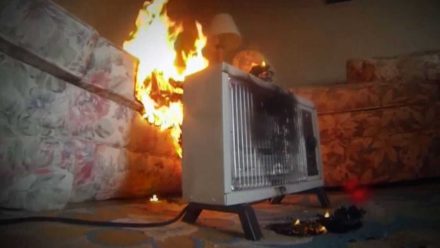CCHD Program Reminds Residents to Heat Homes Safely

Clinton County, February 22, 2022. While the cold winter season hangs on, the Clinton County Health Department (CCHD) is reminding North Country residents to take important safety measures while heating their homes.
“The cold weather brings increased risk of house fires as we use our in-home heating systems more often,” stated Maryann Barto, Public Health Educator in CCHD’s Environmental Health and Safety Division’s Healthy Neighborhoods Program. “Thankfully, there are simple steps that you can take to help prevent these dangers and keep your home safe.”
Decrease risk of house fires by:
Having heating equipment and chimneys cleaned and inspected every year by a qualified professional.
Keeping anything that can burn at least three feet away from heating equipment (i.e. a furnace, fireplace, wood stove, or portable space heater).
Having a three-foot “kid-free zone” around open fires and space heaters.
Testing your smoke & carbon monoxide detectors monthly.
Making and practicing a fire escape plan with your household members.
Using the proper kind of fuel (specified by the manufacturer) for fuel burning heaters.
Ensuring the fireplace has a sturdy screen to stop sparks from flying into the room. Ashes should be cool before putting them in a metal container. Keep the container a safe distance away from your home.
Not using your oven to heat your home.
Turning off portable heaters when leaving the room or going to bed.
Checking for recalls on any heating equipment or fire safety products (www.cpsc.gov).
In addition to smoke detectors, if your home is heated using wood or fuel burning appliances or you have an attached garage, you should have a carbon monoxide (CO) detector. These detectors should be checked on a monthly basis, the batteries should be changed at least twice a year, and the alarm should be replaced every 10 years. “Ensuring your home has proper working 10 year lithium battery or battery-operated smoke detectors and carbon monoxide detectors is critical for safety,” explained Ms. Barto. “These items are your first line of defense in the event of a fire or carbon monoxide leak. Working smoke and carbon monoxide detectors greatly reduce a person’s risk of injury or death.”
Households should also have and practice a fire escape plan. “It’s important to review and practice that plan with your family at least twice a year,” urged Ms. Barto. “Ensure children are aware of what to do in case of a fire. “Working Together for a Healthier Community” – 2 –
Remember to practice staying low and going under the smoke to get to your exit.” Set a safe meeting place, away from the road or driveway; landmarks like a tree or playground set are great meeting places for families with children.
If you have questions regarding heating safety, proper working detectors, need detectors, fire extinguishers, or need assistance in planning an escape plan, please contact a Healthy Neighborhoods Program Educator at 518-565-4870 or visit us on the web at www.clintonhealth.org/healthyneighborhoods.
Posted: February 22nd, 2022 under County Government News, Fire Department News.
